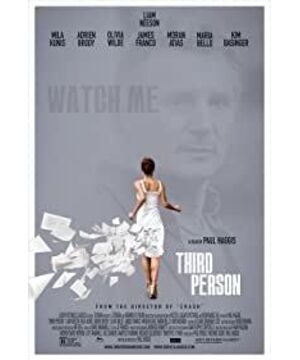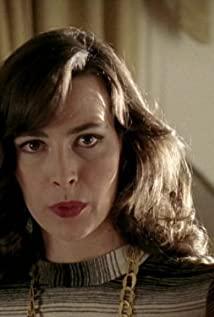Line 1: The writer and his wife separate, stay in a Paris hotel to write for a long time, and have a tryst with his lover, Anne.
Line 2: An American who was separated from his wife after his daughter's death met a gypsy girl in Rome. In order to redeem the girl's daughter, she was faced with the choice of whether to go bankrupt. That daughter may not exist at all and it's just a scam.
Line 3: The painter divorces after his wife nearly kills his son in an accident. Wife competes for son's visitation rights.
I don't know how The Third Person turned into a "Fantasy of Derailment". It doesn't fit the theme at all. This is a "third person" story.
The writer's story is an eye-opener. He himself said, "I am writing a story, and the protagonist can only perceive his feelings through his characters." So his lover, also a reporter, a future writer joked with him, " "He" is so, so is "she", replace "you" and "me" with "he" and "she".
If the audience has not seen which line is real and which line is fiction, even after watching this movie, they can only be confused or simply think that this is a three-line love story. Unfortunately such audiences make up the majority. (It's largely the director's responsibility, but this review focuses on the story and structure of the film. Rather than bashing the director for what's not in place and what's not, I'd rather take the time to talk about how subtle and subtle his ideas are. )
At this time, you can look back at the original story - only line 1 is true, and line 23 is the story written by the writer, but the writer has the habit of letting the protagonist perceive the experience for himself-that is, the habit of replacing himself with the protagonist. Only by distinguishing the unreal and the real in the three lines can we understand what this movie says. The writer often hears a "Look at me!" from behind. And this sentence also appeared in line 23.
Line 2 Line 3 has the same theme, redemption, atonement. At the center is the child.
Even if the Americans knew they might be deceived, they still spent all their money and used 100,000 euros to redeem the gypsy woman he met by chance and the daughter he had never met. Because how did his daughter die? In the swimming pool, he left for thirty seconds to answer a work call, and when he came back, his daughter drowned. He was doing everything possible to atone for his sins, even if it was someone else's daughter who didn't know whether it existed or not.
The painter's wife was forced by the painter to say that her son's "accident" was not an "accident" in order to obtain visitation rights. She just wanted to "teach him a lesson" to prevent him from hurting herself in the future. She almost "deliberately" put his son in a laundry bag and put his life in danger. She was a sinner.
Line 23 is the writer's finished story, and his publisher is not happy with the story.
The writer has fallen into the predicament of Jiang Lang's talents. In the words of the publisher, your first book is shocking! The primitive indifference has no mercy and shame, and once made people sweat while proofreading. The second book, a little less than the first, then the third, the fourth, and the fifth... In your current book, you have random characters making up a lot of excuses for you.
In other words, he was too ashamed to admit that he could not write with naked honesty and fearlessness. And that happens to be the most fundamental quality of good writing.
Contrasting the publisher's words with Line 2 reveals the hidden story without the ending. The writer separated from his wife because his son, like an American daughter, drowned in a swimming pool, and the writer made him drown to answer a phone call.
In line with line 3, "accident" is not "accident", what is the truth hidden by the writer?
With this question in mind, look at what the writer has done. He restarted writing a book in which he confessed his sins, the sins of all men. He didn't even shy away from writing about his lover Anne's incestuous affair with her father, which seemed to her like revenge.
Anne saw his notes and found that he had left him after writing her. The writer continued to write in Paris in solitude, and finally confessed to himself over the phone call from his wife. What he left his son that night was not a "work call", but a call from Annie, the cheating partner. What he still doesn't say is that maybe he was as bored with his son as the painter's wife and wanted to "teach him a lesson" and let him get a taste of what it's like to be flooded, the son begged to "look at me" but he left He lost his son in thirty seconds.
The story of line 2 and line 3 has a happy ending. The American rescued the daughter of the gypsy woman, she did not lie to him, that little girl really exists;
The painter's wife hugged her son under the obstruction or even beating her husband, told how sorry she was, and gave him the doll she bought.
The three-line stories are intertwined with each other, the location and time are changing, and the audience even needs to use the means of decoding to compare to determine which scene actually happened and which scene is just illusory, and whether each scene that actually happened happened in the past or later. Just like Nabokov's novel signs and symbols, place and time are relative, and it is an eternal theme that only human beings are alive to suffer.
Only "third-person" stories have happy endings. Line 1, the writer's story, that is, in reality, he and his lover will be responsible for his son's death, and he will live his life in the fantasy of his son's voice, in the dead of night when he is alone, walking on the street when the crowd is crowded, behind him. "Look at me!" He will forever regret the pain for not really watching him and watching over him;
his lover let him discover her deepest secrets, incest with his father, but betrayed by him, because he really wanted to atone for his sins Write her shame and secrets into the book. She will also always regret the pain in his betrayal and hurt.
View more about Third Person reviews











